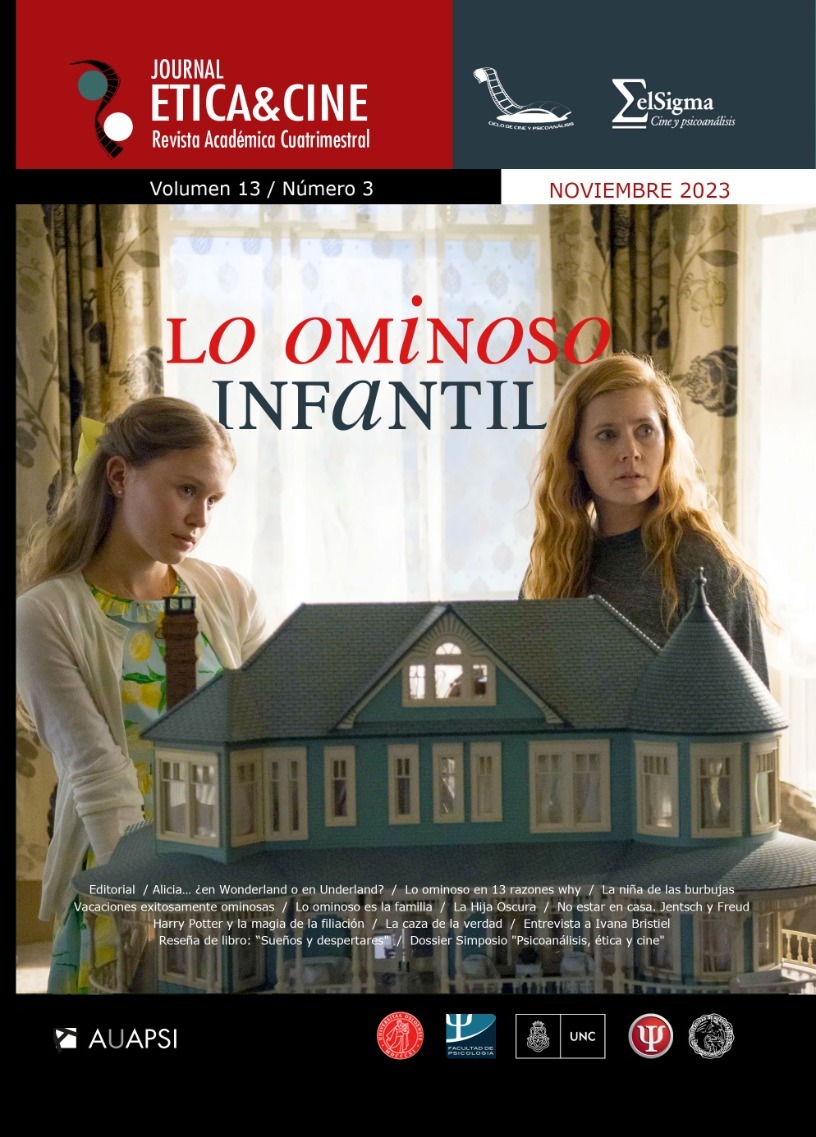A disturbing origin
DOI:
https://doi.org/10.31056/2250.5415.v13.n3.43866Keywords:
Falsified Affiliation, Appropriation, The Uncanny, Animism, magic and omnipotence of thought, Harry PotterAbstract
Harry Potter carries on his body the scar of a disturbing origin. It carries secrets that himself does not know… but at the age of ten, a letter arrives at its destination and the lies about his family history begin to be revealed. Magic appears to him, then, as a strange influence that he does not know where it comes from. This hidden power directs him towards an adventure that involves returning to a terrible past that is updated, again and again, in the deception maintained by his uncles, who have been entrusted with his upbringing and care. We quetion ourselves, in this scenario, abour the place of the family in the human constitution and the subjective consequences of lying about origin, having as backdrop the Argentine case and the treatment given to childhood during the last dictatorship. What dos Harry teach us about the violation of identity? What is the long path of its revelation like? In the service of what is magic presented in this story? We locate three points that are articulated among themselves: the announcement of the lie about the origin, the proximity to the appropriations of identity in Argentina and the resource of magic as a vehicle that enables the elaboration of what remained hidden.
Downloads
References
Agamben, G. (2001). Infancia e historia. Argentina, Adriana Hidalgo editora.
Ariès, P. (1960). El niño y la vida familiar en el antiguo régimen. España: Taurus.
Baudrillard, J. (1997). El continente negro de la infancia. Pantalla Total, España, Anagrama.
Baudrillard, J. (1983). Las estrategias fatales. España, Anagrama.
Columbus, C. (2001). Harry Potter y la piedra filosofal. [película]. Warner Bros Productions.
Columbus, C. (2002). Harry Potter y la cámara secreta. [película]. Warner Bros Productions.
Davoine, F. y Gaudrillère, J. M. (2011): Historia y trauma. Locura de las guerras. Argentina, Fondo de Cultura Económica.
DeMause, LL. (1974). Historia de la Infancia. España, Alianza.
Derrida, J. y Roudinesco, E. (2003). Y mañana, qué… Argentina, Fondo de Cultura Económica.
Elias, N. (1997). La civilización de los padres. Colombia, Norma.
Fiennes, S. y Žižek, S. (2006). The Pervert’s Guide to Cinema. [película]. P Guide Productions.
Freud, S. (1913). Tótem y tabú. Obras Completas, Tomo XIII. Argentina, Amorrortu.
Freud, S. (1919). Lo ominoso. Obras Completas, Tomo XVII, (pp. 217-251). Argentina, Amorrortu.
Gagliardi, L. (2011). Palabra y construcción de la identidad en Harry Potter. X Jornadas Nacionales de Literatura Comparada. Universidad Nacional de La Plata.
Hitchcock, A. (1963). The Birds [película]. Alfred J. Hitchcock Productions.
Lacan, J. (1938). La familia. Argentina, Argonauta.
Lacan, J. (1953). Función y campo de la palabra y del lenguaje en psicoanálisis. Escritos 1, pp. 227-310. Argentina, Siglo XXI Editores.
Lacan, J. (1956-57). El Seminario. Libro 4: La relación de objeto, España, Paidós.
Lacan, J. (1967). Discurso de clausura de las Jornadas sobre las psicosis en el niño. El analiticón. Psicoanálisis con niños, Publicación de la fundación del campo freudiano, pp. 5-15. España, Paradiso.
Lacan, J. (1969). Dos notas sobre el niño. Intervenciones y textos 2, pp. 55 -77, Argentina, Manantial.
Lacan, J. (1966-67). El Seminario. Libro 14: La lógica del fantasma. España, Paidós.
Lacan, J. (1972-73). El Seminario. Libro 20: Aún. España, Paidós.
Lacan, J. (1980). Seminario 27: Disolución. Inédito. Clase del 10-06-1980.
Laurent, E. (s/f): El niño como real del delirio familia”. En CEIP lacaniano Centro de estudios e investigación en psicoanálisis. Disponible en: http://www.centrolacaniano.cl/blog/el-nino-como-real-del-delirio-familiar-laurent-e/
Miller, J. A. (1993). Cosas de familia en el inconciente. Introducción a la clínica lacaniana, pp. 335-346. España, RBA Publicaciones.
Robles, R. (2023). Harry Potter es argentino. Página 12. Recuperado de: https://www.pagina12.com.ar/598131-harry-potter-es-argentino
Rowling, J. K. (1997-2007). Saga Harry Potter. España: Salamanca.
Ulloa, F. (1988). ¿Es Juliana un trofeo? No, Juliana es Sandoval. Fin de Siglo, Nº 16, Oct. 1988, pp. 57-60.
Žižek, S. (1994). Todo lo que usted siempre quiso saber sobre Lacan y nunca se atrevió a preguntarle a Hitchcock. España, Manantial.
Downloads
Published
How to Cite
Issue
Section
License
Copyright (c) 2023 Ética y Cine Journal

This work is licensed under a Creative Commons Attribution-ShareAlike 4.0 International License.
Los autores que publiquen en Ética y Cine Journal aceptan las siguientes condiciones:
Los autores/as conservan los derechos de autor © y permiten la publicación a Ética y Cine Journal, bajo licencia CC BY-SA / Reconocimiento - Reconocimiento-CompartirIgual 4.0 Internacional. La adopción de esta licencia permite copiar, redistribuir, comunicar públicamente la obra, reconociendo los créditos de la misma, y construir sobre el material publicado, debiendo otorgar el crédito apropiado a través de un enlace a la licencia e indicando si se realizaron cambios.

Este obra está bajo una licencia de Creative Commons Reconocimiento-CompartirIgual 4.0 Internacional.




